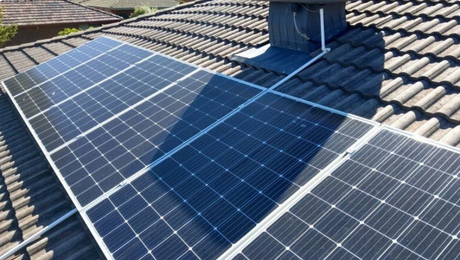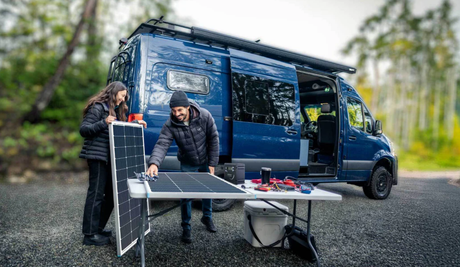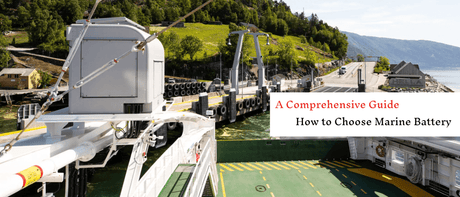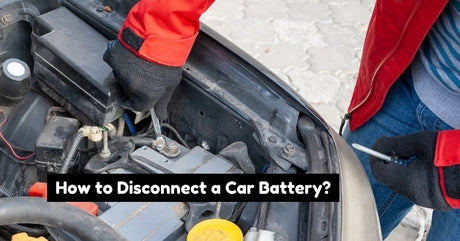Do I need a generator if I already have gone solar?
Gas-powered generators are a popular choice for many campers, travelers, hunters, and people who need access to energy when they’re not near an outlet. You may choose to go the solar route for the same reason of wanting to become energy independent, but you may not be able to always keep the lights on with solar panels alone. Purchasing a gas or solar powered generator can be a great way to supplement your solar installation and make sure your energy needs are covered no matter the conditions. What’s best for you and what should you consider when making a purchase?
What are the 3 types of solar systems?
First off, let’s talk about the three main types of solar installations:
1.On-grid systems (grid-tie solar systems)
On-grid systems are the most common and widely-used solar systems. You do not need to install a battery bank and can simply use energy collected from your panels. When your panels aren’t producing, such as at night or it’s overcast, you can tap into the grid to meet your energy needs.
2. Off-grid solar systems (stand-alone power systems)
Off-grid solar can be a great way to meet your energy demands if you live in a remote area without reliable and affordable access to the grid. Off-grid systems utilize batteries to store energy collected from solar panels. Take great care to properly size your system so it can fit a variety of needs throughout the year, especially in the winter when there are fewer sunlight hours.
3.On-grid systems with battery storage (hybrid systems)
More and more people are choosing to add battery storage to their on-grid projects and take advantage of the benefits of both on- and off-grid systems, such as having energy access during blackouts and also needing to pay for less energy from the grid.
Will solar panels keep the lights on during a blackout?
Not always. Just because you have solar panels doesn’t mean you’ll be able to access power during a blackout.
As a general rule of thumb, if you have battery storage and are not connected to the grid, you’ll be able to keep the lights on with your solar installation in case of a blackout. If your system is connected to the grid, then you most likely will not be able to access power. This is because it would be dangerous for your system to produce energy into the grid during a blackout at a time when utility workers may be working on the lines to get things up and running again in your city.
In order to maintain power during a blackout, you’ll need to be completely off-grid with battery storage or have access to a back-up gas powered generator or solar power station.
Who should purchase back-up power?
If you’ve already added solar to your home or RV, generators can be a great back-up energy solution.
I have an off-grid system: If you’re off-grid and have a decent-sized battery bank, you typically won’t need a battery bank. However, if you live in an area with limited sunlight, a back-up generator may give you increased peace of mind.
I have a grid-tied system: We recommend purchasing a back-up generator in case of blackouts or to cover excess energy needs that aren’t able to be met with solar panels alone. You won’t be able to use your solar panels during a blackout for safety reasons, so running a gas-powered generator will enable you to keep the lights on and appliances running.
I have a hybrid system: A back-up generator is recommended in case of blackouts, but your battery bank should cover your energy needs during stretches of time with low sunlight.
What are solar powered generators?
Gas-powered generators are easy to find, reliable, fairly affordable, but they’re also loud, dirty, heavy, and not the most eco-friendly solution. Solar generators are similar to gas-powered generators in that they are portable systems that let you power your devices and appliances, but instead of running on gas, you simply connect a solar panel to the system.
What are the pros and cons of a solar generator?
There are many benefits to purchasing a solar generator. Solar generators can recharge your batteries, allowing you to run AC appliances while on the road without needing to hook up to external power sources. Solar panels can also work all day long, whether you’re home or not, meaning you could be out for a hike and charging up your batteries in time for movie night at basecamp. This isn’t the case with gas-powered generators.
Pros of Solar Power Stations
- Solar energy is reliable and quiet
- Power stations are portable and lightweight
- They are a sustainable, green option.
- You don’t need to pay for gas.
- Solar is virtually maintenance-free.
- Solar expands your camping options.
Cons of Solar Power Stations
- You need to have enough sunlight to collect enough energy.
- You need to purchase external solar panels to collect energy.
Solar power stations typically cost between $600 and $1,500.
What are the pros and cons of gas-powered generators?
That said, gas-powered generators are also a feasible option for many individuals.
Pros of Gas-Powered Generators
- Generators are reliable in all kinds of weather.
- A generator is usually cheaper than a full solar installation.
- Generators can handle high energy loads.
Cons of Gas-Powered Generators
- Generators are heavy and noisy.
- You have to make sure you have gas on hand to run them.
- Gas-powered generators are a less sustainable choice than solar.
Gas-powered generators vary in price between $600 and upwards of $3,500.
The Verdict
Purchasing a generator can give you increased peace of mind and freedom by ensuring that you have access to energy in any scenario, from natural disasters to blackouts. They also eliminate the need of having to build an excessively large system by making sure that you have enough energy access in the winter when there may be stretches of time without enough sunlight to keep your panels charged. Weigh the pros and cons of each technology and consider the specifics of your lifestyle and you’ll be able to make the best decision for you and your home.









